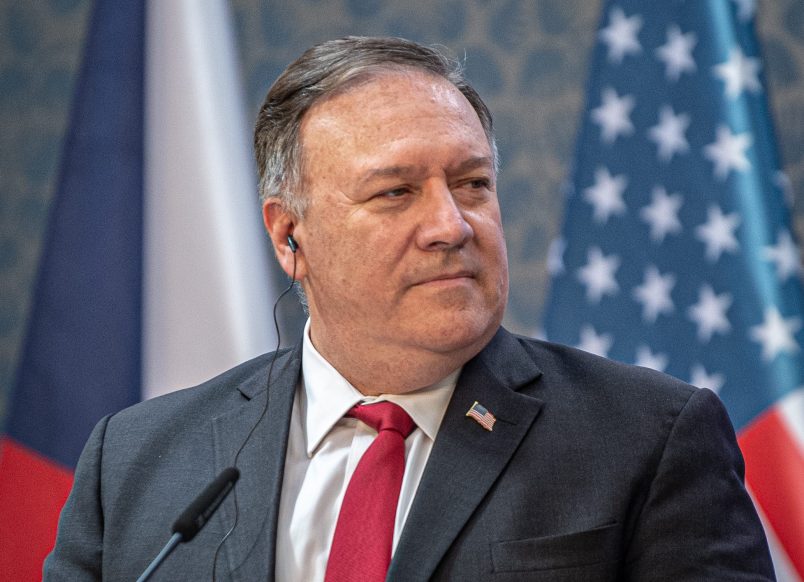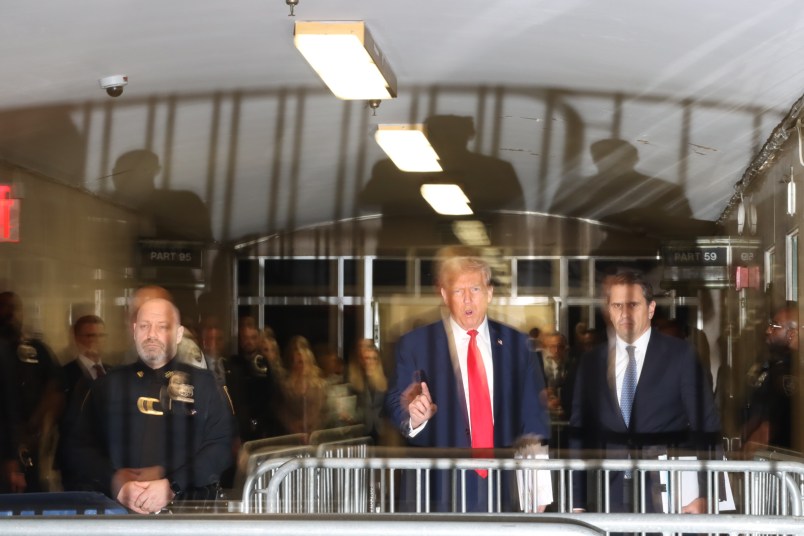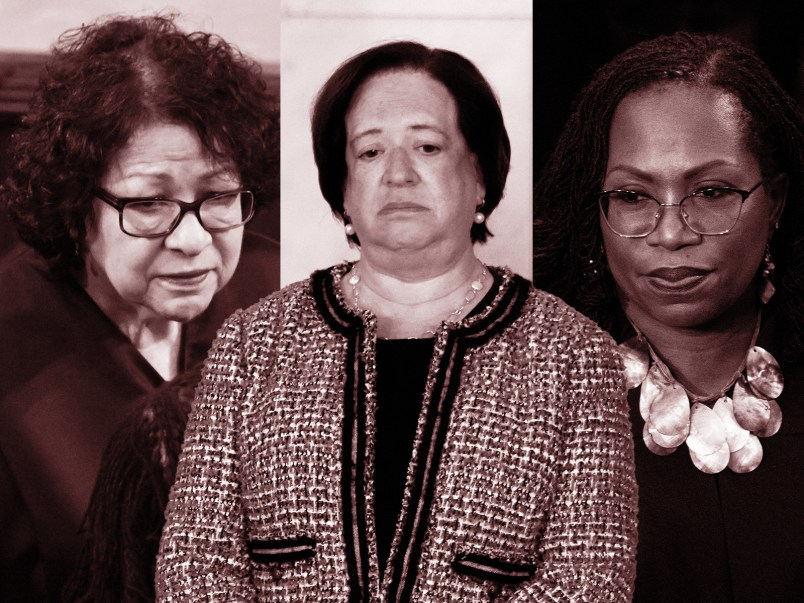Secretary of State Mike Pompeo kept up his attacks on members of Congress Wednesday after an internal watchdog report found that the State Department didn’t fully consider potential civilian casualties when it used emergency powers to sell arms to Saudi Arabia last year.
The arms sales supplied Saudi Arabia, the United Arab Emirates and Jordan with billions of dollars in weapons. Congress had blocked some of the sales for months before Pompeo used a May 2019 emergency declaration to push them through.
Legislators on both sides of the aisle have denounced the ongoing Saudi-led and American-supplied bombing campaign in Yemen, which has resulted in what the United Nations calls the world’s worst humanitarian crisis.
And though the watchdog report found that the State Department didn’t fully assess the risk to civilians of the arms sales, Pompeo on Wednesday celebrated what the department has characterized as an exoneration.
“We’d had United States senators impugn the integrity of foreign service officers, suggesting they had done something unlawful,” Pompeo said Wednesday. “It was outrageous then. It’s outrageous for them to continue to make those claims.”
The report found that the emergency powers themselves were used according to the law, as Pompeo pointed out: “We did everything by the book. We complied with the law, that’s what the State Department OIG found as well,” he said, referring to the Office of the Inspector General.
But the secretary failed to mention that the Arms Export Control act doesn’t actually define the term “emergency” — and that, as a result, the OIG “did not evaluate” whether the situation constituted an emergency.
What’s more, an unredacted version of the report, which was leaked shortly after its publication, shows Pompeo planning to use his emergency powers for weeks before announcing the news publicly — suggesting that the urgency one might expect to find in a true “emergency” wasn’t there.
House Foreign Affairs Committee Chairman Eliot Engel (D-CA) said in a statement Tuesday that no one doubted that the mechanics of the State Department’s emergency powers.
“The question was always, ‘Did the administration abuse that authority in order to ram through more than $8 billion in sales to Gulf countries?'” he said. “The IG didn’t offer an opinion on that. But the report’s details signal a resounding, ‘Yes.’”
State ‘Did Not Fully Assess Risks’ Of Civilian Casualties
Asked about the report’s findings on civilian casualties Wednesday while at a press conference with the Czech Prime Minister, Pompeo went after the Office of the Inspector General directly.
“As for the statement that was in the IG report, it’s totally unfounded,” he said. “We were very thoughtful about how we reviewed the risks.”
“We want to protect civilian lives in Yemen,” he added later. “We want to protect civilian lives in Riyadh, in Abu Dhabi, and in Dubai. And the decision that we made absolutely did that.”
The details of the department’s analysis of the civilian toll of these weapons sales are mostly classified. At several points in the report, the OIG points to an “annex” that details Pompeo’s decision. That document, Engel told members of the Foreign Affairs Committee, is only available to read in the committee’s Sensitive Compartmented Information Facility, or SCIF.
“We understand the Department may have inappropriately redacted certain sections of the classified annex sent to Congress,” Engel wrote to committee members Tuesday.
Redacted Report Obscures Pompeo’s Emergency Orders
The State Department presented the emergency declaration as an urgent matter last year, when it announced the sales — but the IG report tells a slightly different story.
As early as April 3, investigators found, department staff had proposed using the emergency powers to proceed with the arms transfers despite several congressional holds. On May 4, according to the report, Pompeo directed the department’s Bureau of Political-Military and Legislative Affairs to complete the process of certifying an emergency by May 24.
Notably, this portion of the report was heavily redacted in the version the OIG released publicly. Politico subsequently obtained and published an unredacted version Tuesday. See an example of the differences below:
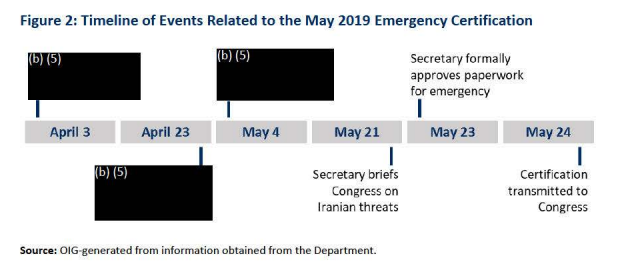
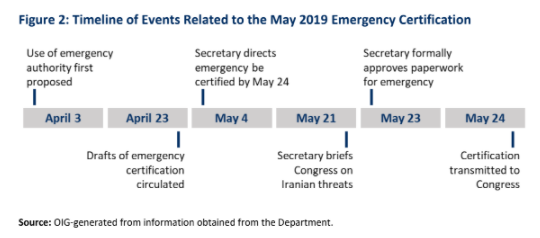
Engel noted the report’s timeline to underline his point that the emergency declaration was a “sham.”
“What sort of emergency makes itself known a few months in advance and can be resolved with weapons delivered years later?” he wrote.
Hints Of Political Pressure
The inspector general in place when the review started, Steve Linick, was fired in May as part of a wave of watchdog firings encouraged by President Donald Trump.
And in subsequent congressional testimony, Linick said that a close friend of Pompeo’s, Under Secretary of State for Management Brian Bulatao, had expected him to behave like a partisan. At one point, Linick testified, Bulato tried to pressure him not to investigate the Saudi arms sales, telling the IG that it “wasn’t an appropriate review because it was a review of policy.”
Linick’s acting replacement, Stephen Akard, resigned last week after less than three months on the job. The department’s deputy inspector general and new acting inspector general, Diana Shaw, wrote the report that was released Tuesday.
In a letter to Congress accompanying the report, Shaw noted the heavily redacted classified annex to the report — the part that detailed the civilian cost of the arms sales. “The Department asserted that its requested redactions were necessary to protect executive branch confidentiality interests,” she wrote.
“Further,” she added, the Department “stated its position that the Secretary ‘has the authority to direct the OIG not to disclose privileged information, and the Department may do so without any final assertion of executive privilege.’”





